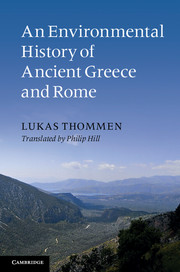Book contents
- Frontmatter
- Contents
- Figures
- Preface
- Introduction
- Part I Greece
- Part II Rome
- Chapter 11 The geographic space
- Chapter 12 People and nature
- Chapter 13 Agriculture
- Chapter 14 Forests and timber
- Chapter 15 Gardens
- Chapter 16 Animals
- Chapter 17 Food
- Chapter 18 Fire and water
- Chapter 19 Earthquakes and volcanoes
- Chapter 20 Mining
- Chapter 21 Urban problems and rural villa construction
- Chapter 22 The environment in Roman Britain
- Conclusion
- Chronology
- Further reading
- Sources
- Bibliography
- Index
Chapter 12 - People and nature
Published online by Cambridge University Press: 05 June 2012
- Frontmatter
- Contents
- Figures
- Preface
- Introduction
- Part I Greece
- Part II Rome
- Chapter 11 The geographic space
- Chapter 12 People and nature
- Chapter 13 Agriculture
- Chapter 14 Forests and timber
- Chapter 15 Gardens
- Chapter 16 Animals
- Chapter 17 Food
- Chapter 18 Fire and water
- Chapter 19 Earthquakes and volcanoes
- Chapter 20 Mining
- Chapter 21 Urban problems and rural villa construction
- Chapter 22 The environment in Roman Britain
- Conclusion
- Chronology
- Further reading
- Sources
- Bibliography
- Index
Summary
The Roman calendar was filled with feast days associated with the divinity of nature and her gifts: the Fordicidia for the earth mother Tellus, the Cerialia for the corn goddess Ceres, and the Vinalia for Jupiter and Venus. Moreover, in springtime, the Ambarvalia was held for Dea Dia, the goddess of farming, and the Ludi Florales for Flora, the goddess of plants; in the autumn, the Vertumnalia for Vertumnus and Pomona celebrated the seasonal blessing of fruit. As a peasant people close to nature, the Romans saw the trees, woods and crops as gifts of the gods, but they also knew how to exploit nature and subjugate it. The cultivation of the countryside by clearing, parcelling and road-building was celebrated as a victory over wild nature. During the Augustan period, the poets Vergil and Propertius praised the superior strength of the Roman Empire precisely because of its better environment. Augustus himself propagated the concept of world domination, according to which the Romans were viewed as an element of divine providence. The world was pacified by the Pax Augusta, and in Rome between 13 and 9 bc the Peace Altar was built; there the nurturing Mother Earth (Tellus) was displayed alongside the god-fearing imperial family.
- Type
- Chapter
- Information
- An Environmental History of Ancient Greece and Rome , pp. 76 - 78Publisher: Cambridge University PressPrint publication year: 2012



